Report on Professional Identity and Practice within Thomas Cook
VerifiedAdded on 2021/02/20
|13
|3935
|66
Report
AI Summary
This report delves into the concept of professional identity, exploring how individuals perceive themselves within an occupational context, using Thomas Cook as a case study. It examines the key benefits of ongoing professional development for stakeholders, scrutinizes employer expectations of skills and competencies, and includes a self-assessment of abilities for a customer service executive role. The report further analyzes various learning theories and approaches used for personal and professional development, proposes an improvement plan, and concludes with a job interview simulation and review of its strengths and weaknesses. The report provides a thorough analysis of professional identity and practice within the context of the service industry.
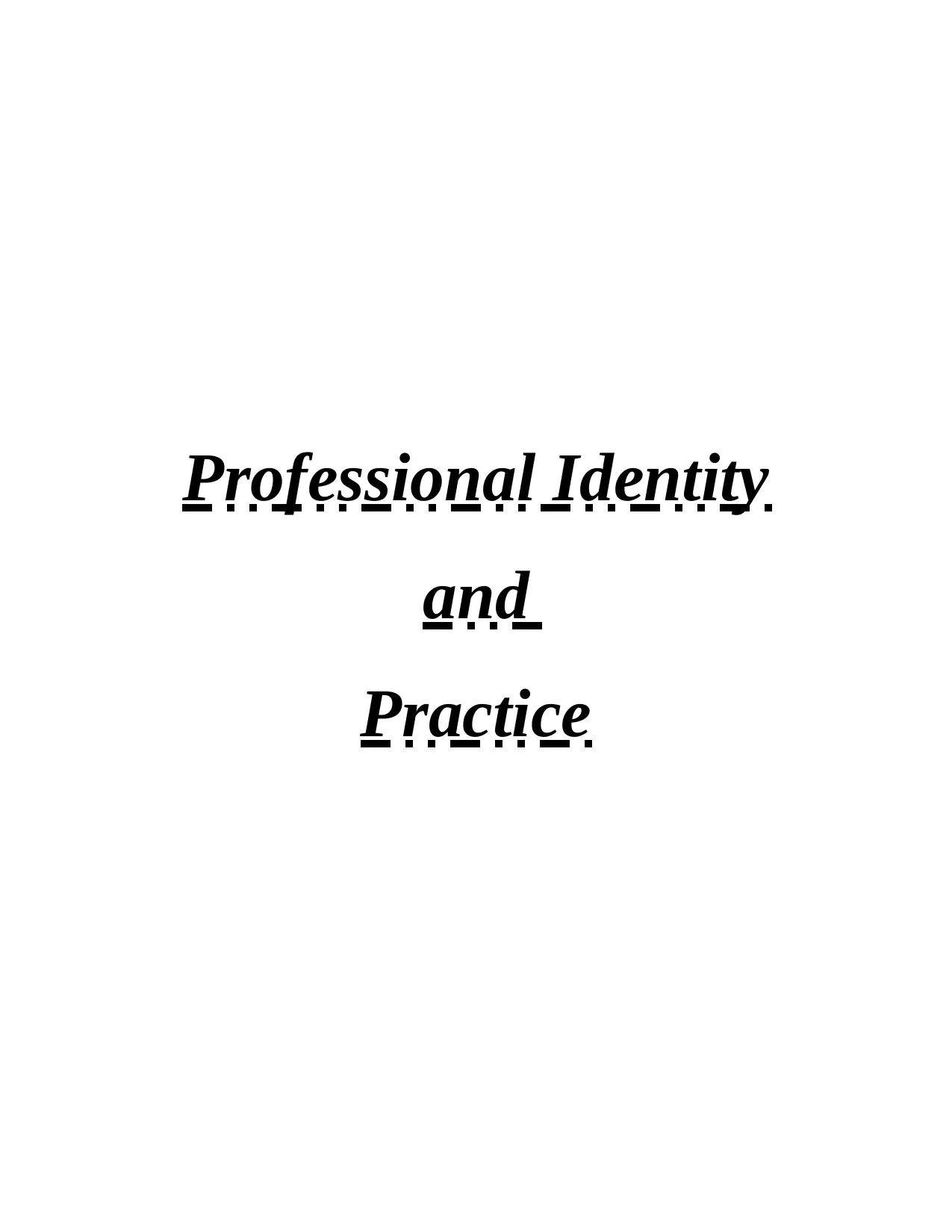
Professional Identity
and
Practice
and
Practice
Paraphrase This Document
Need a fresh take? Get an instant paraphrase of this document with our AI Paraphraser
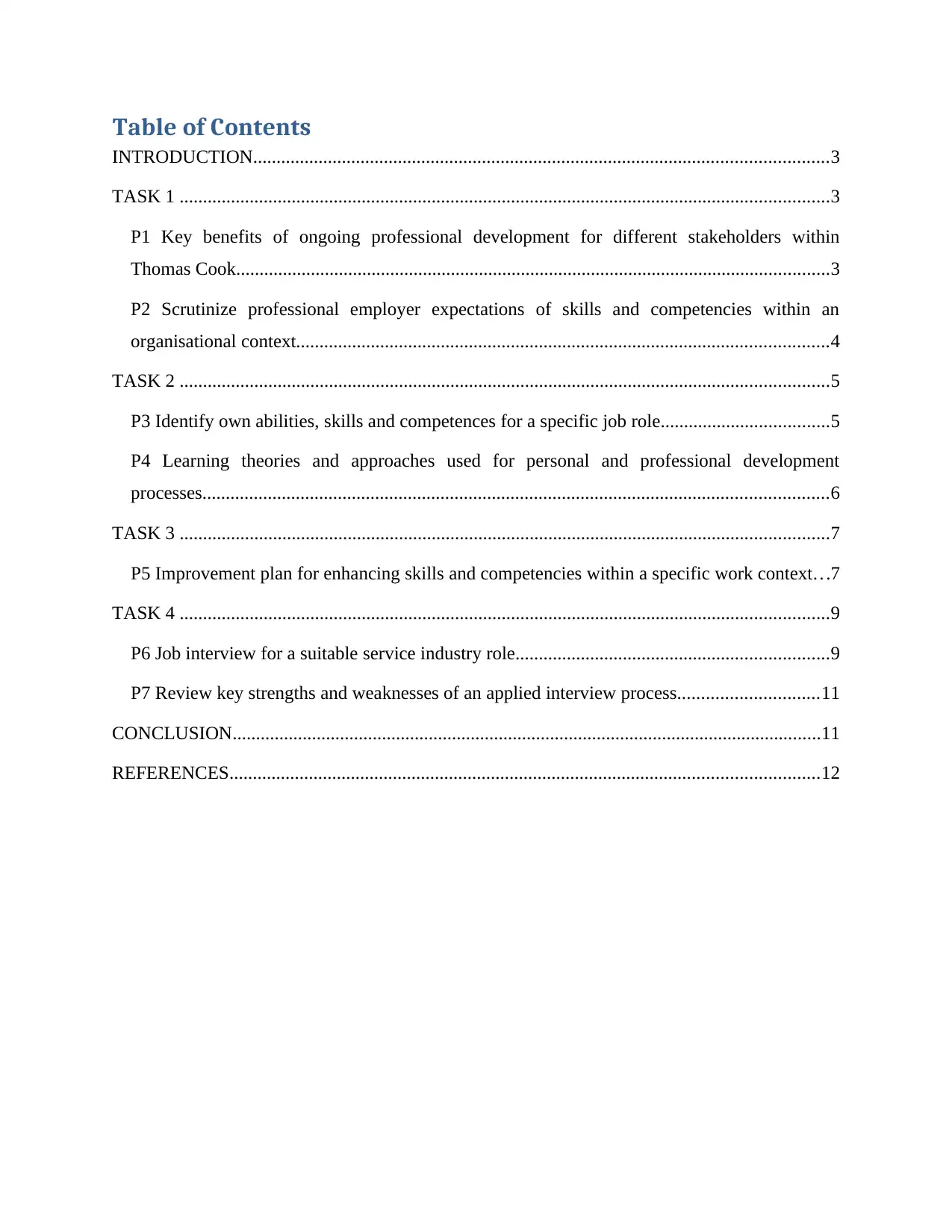
Table of Contents
INTRODUCTION...........................................................................................................................3
TASK 1 ...........................................................................................................................................3
P1 Key benefits of ongoing professional development for different stakeholders within
Thomas Cook...............................................................................................................................3
P2 Scrutinize professional employer expectations of skills and competencies within an
organisational context..................................................................................................................4
TASK 2 ...........................................................................................................................................5
P3 Identify own abilities, skills and competences for a specific job role....................................5
P4 Learning theories and approaches used for personal and professional development
processes......................................................................................................................................6
TASK 3 ...........................................................................................................................................7
P5 Improvement plan for enhancing skills and competencies within a specific work context.. .7
TASK 4 ...........................................................................................................................................9
P6 Job interview for a suitable service industry role...................................................................9
P7 Review key strengths and weaknesses of an applied interview process..............................11
CONCLUSION..............................................................................................................................11
REFERENCES..............................................................................................................................12
INTRODUCTION...........................................................................................................................3
TASK 1 ...........................................................................................................................................3
P1 Key benefits of ongoing professional development for different stakeholders within
Thomas Cook...............................................................................................................................3
P2 Scrutinize professional employer expectations of skills and competencies within an
organisational context..................................................................................................................4
TASK 2 ...........................................................................................................................................5
P3 Identify own abilities, skills and competences for a specific job role....................................5
P4 Learning theories and approaches used for personal and professional development
processes......................................................................................................................................6
TASK 3 ...........................................................................................................................................7
P5 Improvement plan for enhancing skills and competencies within a specific work context.. .7
TASK 4 ...........................................................................................................................................9
P6 Job interview for a suitable service industry role...................................................................9
P7 Review key strengths and weaknesses of an applied interview process..............................11
CONCLUSION..............................................................................................................................11
REFERENCES..............................................................................................................................12
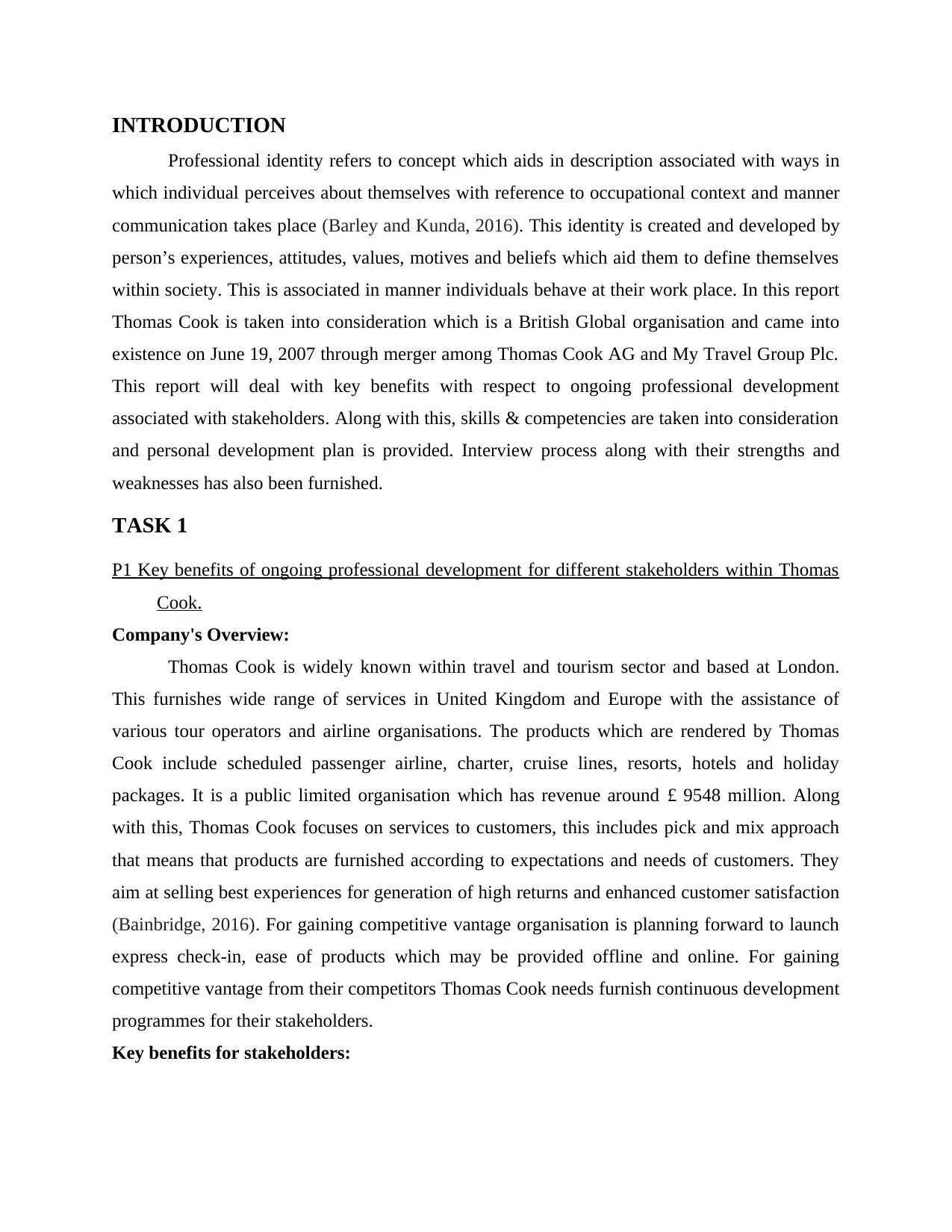
INTRODUCTION
Professional identity refers to concept which aids in description associated with ways in
which individual perceives about themselves with reference to occupational context and manner
communication takes place (Barley and Kunda, 2016). This identity is created and developed by
person’s experiences, attitudes, values, motives and beliefs which aid them to define themselves
within society. This is associated in manner individuals behave at their work place. In this report
Thomas Cook is taken into consideration which is a British Global organisation and came into
existence on June 19, 2007 through merger among Thomas Cook AG and My Travel Group Plc.
This report will deal with key benefits with respect to ongoing professional development
associated with stakeholders. Along with this, skills & competencies are taken into consideration
and personal development plan is provided. Interview process along with their strengths and
weaknesses has also been furnished.
TASK 1
P1 Key benefits of ongoing professional development for different stakeholders within Thomas
Cook.
Company's Overview:
Thomas Cook is widely known within travel and tourism sector and based at London.
This furnishes wide range of services in United Kingdom and Europe with the assistance of
various tour operators and airline organisations. The products which are rendered by Thomas
Cook include scheduled passenger airline, charter, cruise lines, resorts, hotels and holiday
packages. It is a public limited organisation which has revenue around £ 9548 million. Along
with this, Thomas Cook focuses on services to customers, this includes pick and mix approach
that means that products are furnished according to expectations and needs of customers. They
aim at selling best experiences for generation of high returns and enhanced customer satisfaction
(Bainbridge, 2016). For gaining competitive vantage organisation is planning forward to launch
express check-in, ease of products which may be provided offline and online. For gaining
competitive vantage from their competitors Thomas Cook needs furnish continuous development
programmes for their stakeholders.
Key benefits for stakeholders:
Professional identity refers to concept which aids in description associated with ways in
which individual perceives about themselves with reference to occupational context and manner
communication takes place (Barley and Kunda, 2016). This identity is created and developed by
person’s experiences, attitudes, values, motives and beliefs which aid them to define themselves
within society. This is associated in manner individuals behave at their work place. In this report
Thomas Cook is taken into consideration which is a British Global organisation and came into
existence on June 19, 2007 through merger among Thomas Cook AG and My Travel Group Plc.
This report will deal with key benefits with respect to ongoing professional development
associated with stakeholders. Along with this, skills & competencies are taken into consideration
and personal development plan is provided. Interview process along with their strengths and
weaknesses has also been furnished.
TASK 1
P1 Key benefits of ongoing professional development for different stakeholders within Thomas
Cook.
Company's Overview:
Thomas Cook is widely known within travel and tourism sector and based at London.
This furnishes wide range of services in United Kingdom and Europe with the assistance of
various tour operators and airline organisations. The products which are rendered by Thomas
Cook include scheduled passenger airline, charter, cruise lines, resorts, hotels and holiday
packages. It is a public limited organisation which has revenue around £ 9548 million. Along
with this, Thomas Cook focuses on services to customers, this includes pick and mix approach
that means that products are furnished according to expectations and needs of customers. They
aim at selling best experiences for generation of high returns and enhanced customer satisfaction
(Bainbridge, 2016). For gaining competitive vantage organisation is planning forward to launch
express check-in, ease of products which may be provided offline and online. For gaining
competitive vantage from their competitors Thomas Cook needs furnish continuous development
programmes for their stakeholders.
Key benefits for stakeholders:
⊘ This is a preview!⊘
Do you want full access?
Subscribe today to unlock all pages.

Trusted by 1+ million students worldwide
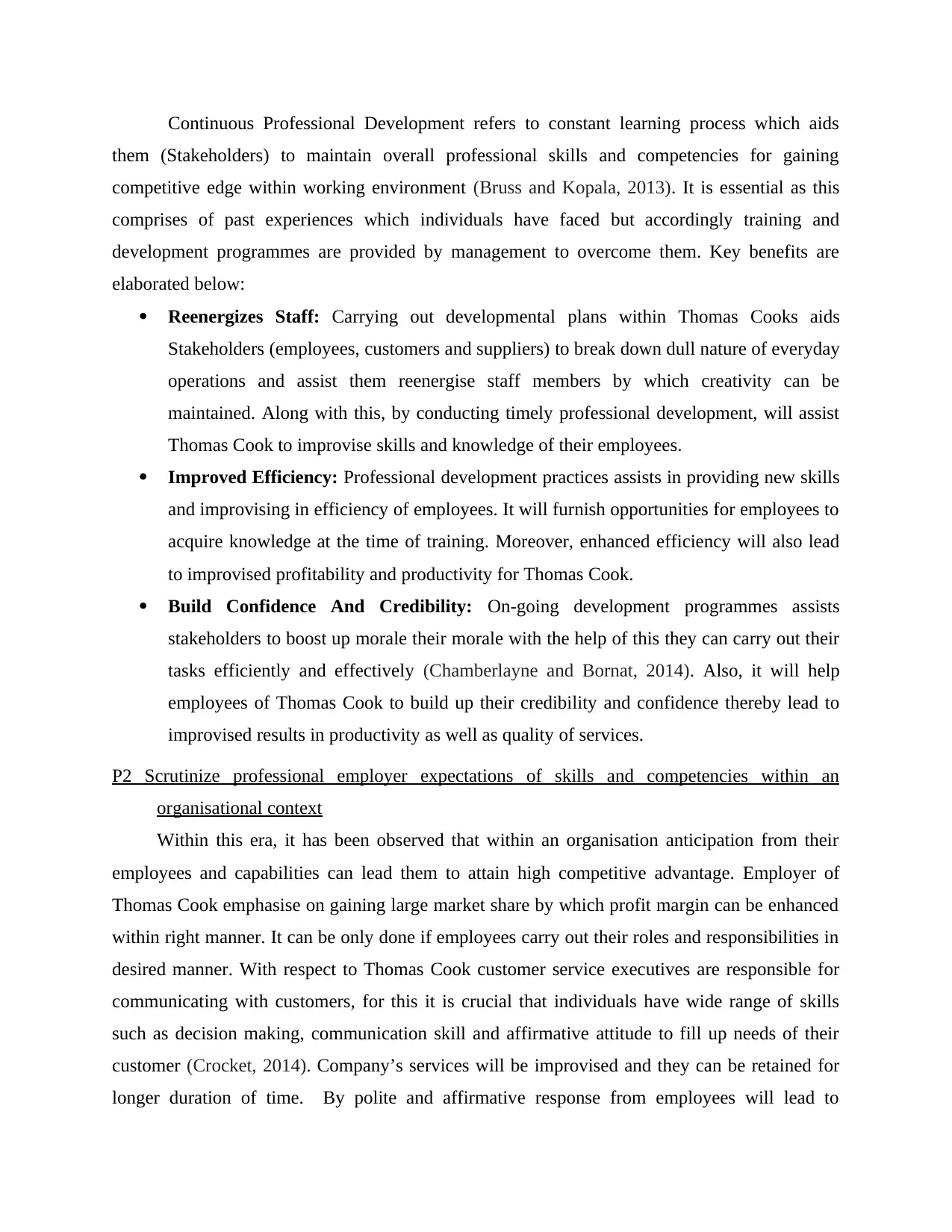
Continuous Professional Development refers to constant learning process which aids
them (Stakeholders) to maintain overall professional skills and competencies for gaining
competitive edge within working environment (Bruss and Kopala, 2013). It is essential as this
comprises of past experiences which individuals have faced but accordingly training and
development programmes are provided by management to overcome them. Key benefits are
elaborated below:
Reenergizes Staff: Carrying out developmental plans within Thomas Cooks aids
Stakeholders (employees, customers and suppliers) to break down dull nature of everyday
operations and assist them reenergise staff members by which creativity can be
maintained. Along with this, by conducting timely professional development, will assist
Thomas Cook to improvise skills and knowledge of their employees.
Improved Efficiency: Professional development practices assists in providing new skills
and improvising in efficiency of employees. It will furnish opportunities for employees to
acquire knowledge at the time of training. Moreover, enhanced efficiency will also lead
to improvised profitability and productivity for Thomas Cook.
Build Confidence And Credibility: On-going development programmes assists
stakeholders to boost up morale their morale with the help of this they can carry out their
tasks efficiently and effectively (Chamberlayne and Bornat, 2014). Also, it will help
employees of Thomas Cook to build up their credibility and confidence thereby lead to
improvised results in productivity as well as quality of services.
P2 Scrutinize professional employer expectations of skills and competencies within an
organisational context
Within this era, it has been observed that within an organisation anticipation from their
employees and capabilities can lead them to attain high competitive advantage. Employer of
Thomas Cook emphasise on gaining large market share by which profit margin can be enhanced
within right manner. It can be only done if employees carry out their roles and responsibilities in
desired manner. With respect to Thomas Cook customer service executives are responsible for
communicating with customers, for this it is crucial that individuals have wide range of skills
such as decision making, communication skill and affirmative attitude to fill up needs of their
customer (Crocket, 2014). Company’s services will be improvised and they can be retained for
longer duration of time. By polite and affirmative response from employees will lead to
them (Stakeholders) to maintain overall professional skills and competencies for gaining
competitive edge within working environment (Bruss and Kopala, 2013). It is essential as this
comprises of past experiences which individuals have faced but accordingly training and
development programmes are provided by management to overcome them. Key benefits are
elaborated below:
Reenergizes Staff: Carrying out developmental plans within Thomas Cooks aids
Stakeholders (employees, customers and suppliers) to break down dull nature of everyday
operations and assist them reenergise staff members by which creativity can be
maintained. Along with this, by conducting timely professional development, will assist
Thomas Cook to improvise skills and knowledge of their employees.
Improved Efficiency: Professional development practices assists in providing new skills
and improvising in efficiency of employees. It will furnish opportunities for employees to
acquire knowledge at the time of training. Moreover, enhanced efficiency will also lead
to improvised profitability and productivity for Thomas Cook.
Build Confidence And Credibility: On-going development programmes assists
stakeholders to boost up morale their morale with the help of this they can carry out their
tasks efficiently and effectively (Chamberlayne and Bornat, 2014). Also, it will help
employees of Thomas Cook to build up their credibility and confidence thereby lead to
improvised results in productivity as well as quality of services.
P2 Scrutinize professional employer expectations of skills and competencies within an
organisational context
Within this era, it has been observed that within an organisation anticipation from their
employees and capabilities can lead them to attain high competitive advantage. Employer of
Thomas Cook emphasise on gaining large market share by which profit margin can be enhanced
within right manner. It can be only done if employees carry out their roles and responsibilities in
desired manner. With respect to Thomas Cook customer service executives are responsible for
communicating with customers, for this it is crucial that individuals have wide range of skills
such as decision making, communication skill and affirmative attitude to fill up needs of their
customer (Crocket, 2014). Company’s services will be improvised and they can be retained for
longer duration of time. By polite and affirmative response from employees will lead to
Paraphrase This Document
Need a fresh take? Get an instant paraphrase of this document with our AI Paraphraser
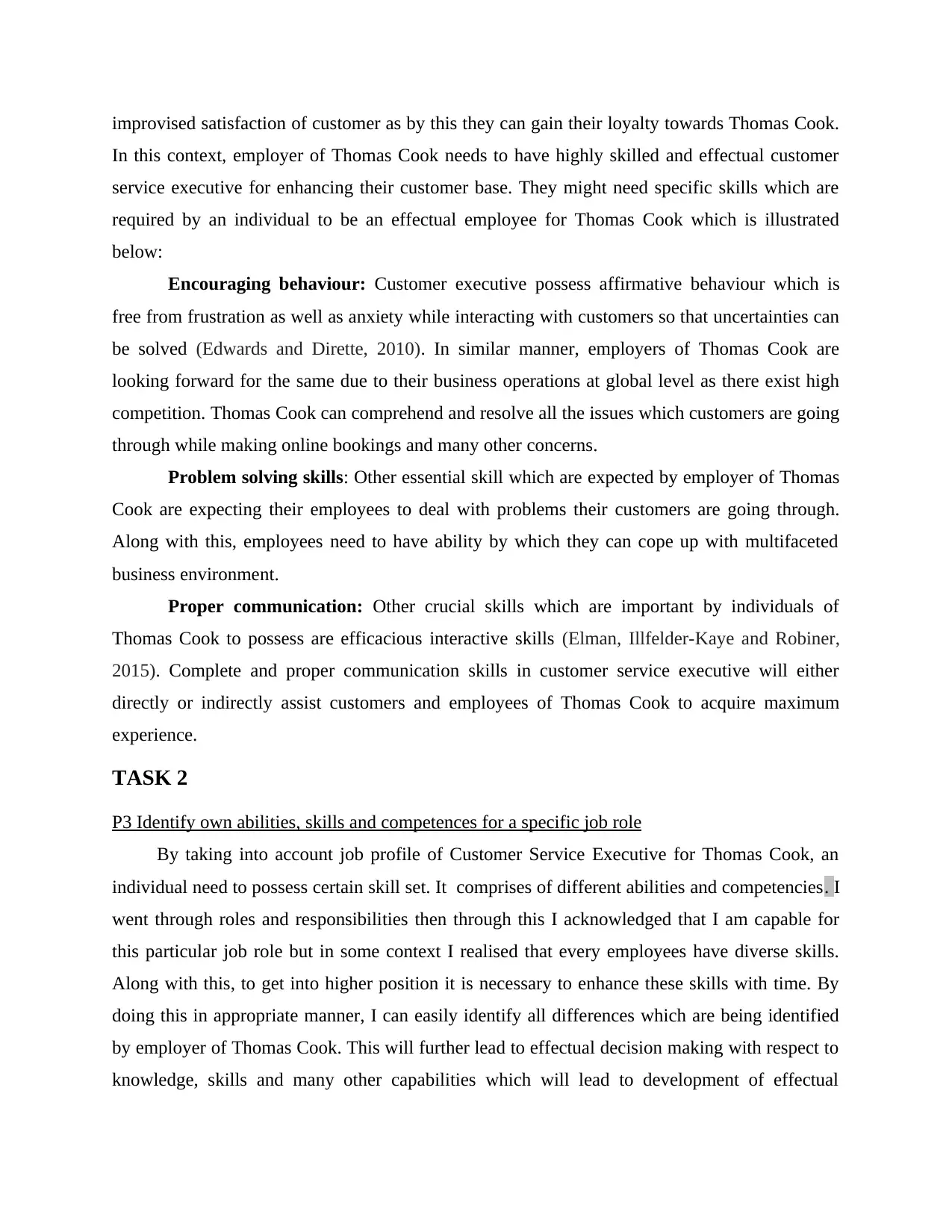
improvised satisfaction of customer as by this they can gain their loyalty towards Thomas Cook.
In this context, employer of Thomas Cook needs to have highly skilled and effectual customer
service executive for enhancing their customer base. They might need specific skills which are
required by an individual to be an effectual employee for Thomas Cook which is illustrated
below:
Encouraging behaviour: Customer executive possess affirmative behaviour which is
free from frustration as well as anxiety while interacting with customers so that uncertainties can
be solved (Edwards and Dirette, 2010). In similar manner, employers of Thomas Cook are
looking forward for the same due to their business operations at global level as there exist high
competition. Thomas Cook can comprehend and resolve all the issues which customers are going
through while making online bookings and many other concerns.
Problem solving skills: Other essential skill which are expected by employer of Thomas
Cook are expecting their employees to deal with problems their customers are going through.
Along with this, employees need to have ability by which they can cope up with multifaceted
business environment.
Proper communication: Other crucial skills which are important by individuals of
Thomas Cook to possess are efficacious interactive skills (Elman, Illfelder-Kaye and Robiner,
2015). Complete and proper communication skills in customer service executive will either
directly or indirectly assist customers and employees of Thomas Cook to acquire maximum
experience.
TASK 2
P3 Identify own abilities, skills and competences for a specific job role
By taking into account job profile of Customer Service Executive for Thomas Cook, an
individual need to possess certain skill set. It comprises of different abilities and competencies. I
went through roles and responsibilities then through this I acknowledged that I am capable for
this particular job role but in some context I realised that every employees have diverse skills.
Along with this, to get into higher position it is necessary to enhance these skills with time. By
doing this in appropriate manner, I can easily identify all differences which are being identified
by employer of Thomas Cook. This will further lead to effectual decision making with respect to
knowledge, skills and many other capabilities which will lead to development of effectual
In this context, employer of Thomas Cook needs to have highly skilled and effectual customer
service executive for enhancing their customer base. They might need specific skills which are
required by an individual to be an effectual employee for Thomas Cook which is illustrated
below:
Encouraging behaviour: Customer executive possess affirmative behaviour which is
free from frustration as well as anxiety while interacting with customers so that uncertainties can
be solved (Edwards and Dirette, 2010). In similar manner, employers of Thomas Cook are
looking forward for the same due to their business operations at global level as there exist high
competition. Thomas Cook can comprehend and resolve all the issues which customers are going
through while making online bookings and many other concerns.
Problem solving skills: Other essential skill which are expected by employer of Thomas
Cook are expecting their employees to deal with problems their customers are going through.
Along with this, employees need to have ability by which they can cope up with multifaceted
business environment.
Proper communication: Other crucial skills which are important by individuals of
Thomas Cook to possess are efficacious interactive skills (Elman, Illfelder-Kaye and Robiner,
2015). Complete and proper communication skills in customer service executive will either
directly or indirectly assist customers and employees of Thomas Cook to acquire maximum
experience.
TASK 2
P3 Identify own abilities, skills and competences for a specific job role
By taking into account job profile of Customer Service Executive for Thomas Cook, an
individual need to possess certain skill set. It comprises of different abilities and competencies. I
went through roles and responsibilities then through this I acknowledged that I am capable for
this particular job role but in some context I realised that every employees have diverse skills.
Along with this, to get into higher position it is necessary to enhance these skills with time. By
doing this in appropriate manner, I can easily identify all differences which are being identified
by employer of Thomas Cook. This will further lead to effectual decision making with respect to
knowledge, skills and many other capabilities which will lead to development of effectual
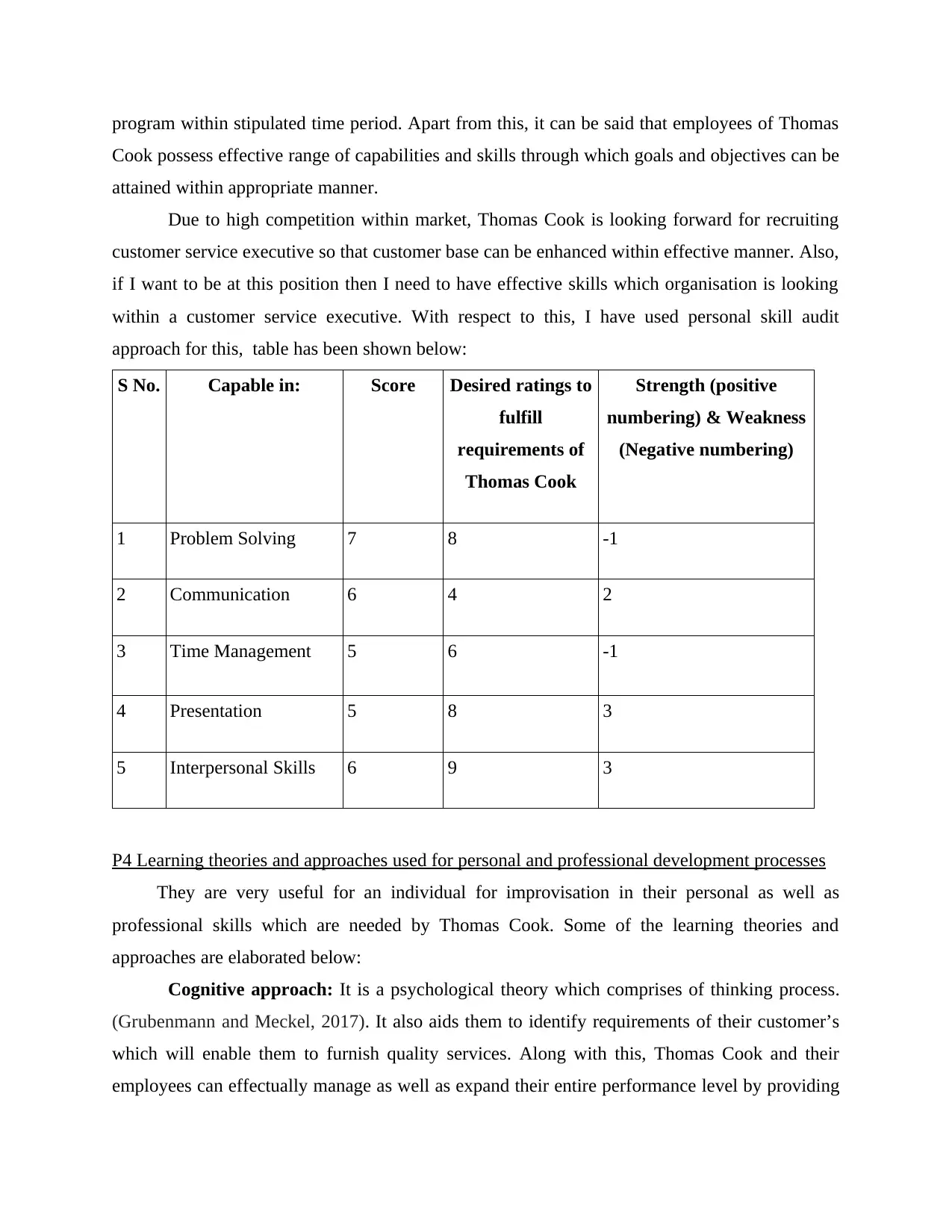
program within stipulated time period. Apart from this, it can be said that employees of Thomas
Cook possess effective range of capabilities and skills through which goals and objectives can be
attained within appropriate manner.
Due to high competition within market, Thomas Cook is looking forward for recruiting
customer service executive so that customer base can be enhanced within effective manner. Also,
if I want to be at this position then I need to have effective skills which organisation is looking
within a customer service executive. With respect to this, I have used personal skill audit
approach for this, table has been shown below:
S No. Capable in: Score Desired ratings to
fulfill
requirements of
Thomas Cook
Strength (positive
numbering) & Weakness
(Negative numbering)
1 Problem Solving 7 8 -1
2 Communication 6 4 2
3 Time Management 5 6 -1
4 Presentation 5 8 3
5 Interpersonal Skills 6 9 3
P4 Learning theories and approaches used for personal and professional development processes
They are very useful for an individual for improvisation in their personal as well as
professional skills which are needed by Thomas Cook. Some of the learning theories and
approaches are elaborated below:
Cognitive approach: It is a psychological theory which comprises of thinking process.
(Grubenmann and Meckel, 2017). It also aids them to identify requirements of their customer’s
which will enable them to furnish quality services. Along with this, Thomas Cook and their
employees can effectually manage as well as expand their entire performance level by providing
Cook possess effective range of capabilities and skills through which goals and objectives can be
attained within appropriate manner.
Due to high competition within market, Thomas Cook is looking forward for recruiting
customer service executive so that customer base can be enhanced within effective manner. Also,
if I want to be at this position then I need to have effective skills which organisation is looking
within a customer service executive. With respect to this, I have used personal skill audit
approach for this, table has been shown below:
S No. Capable in: Score Desired ratings to
fulfill
requirements of
Thomas Cook
Strength (positive
numbering) & Weakness
(Negative numbering)
1 Problem Solving 7 8 -1
2 Communication 6 4 2
3 Time Management 5 6 -1
4 Presentation 5 8 3
5 Interpersonal Skills 6 9 3
P4 Learning theories and approaches used for personal and professional development processes
They are very useful for an individual for improvisation in their personal as well as
professional skills which are needed by Thomas Cook. Some of the learning theories and
approaches are elaborated below:
Cognitive approach: It is a psychological theory which comprises of thinking process.
(Grubenmann and Meckel, 2017). It also aids them to identify requirements of their customer’s
which will enable them to furnish quality services. Along with this, Thomas Cook and their
employees can effectually manage as well as expand their entire performance level by providing
⊘ This is a preview!⊘
Do you want full access?
Subscribe today to unlock all pages.

Trusted by 1+ million students worldwide
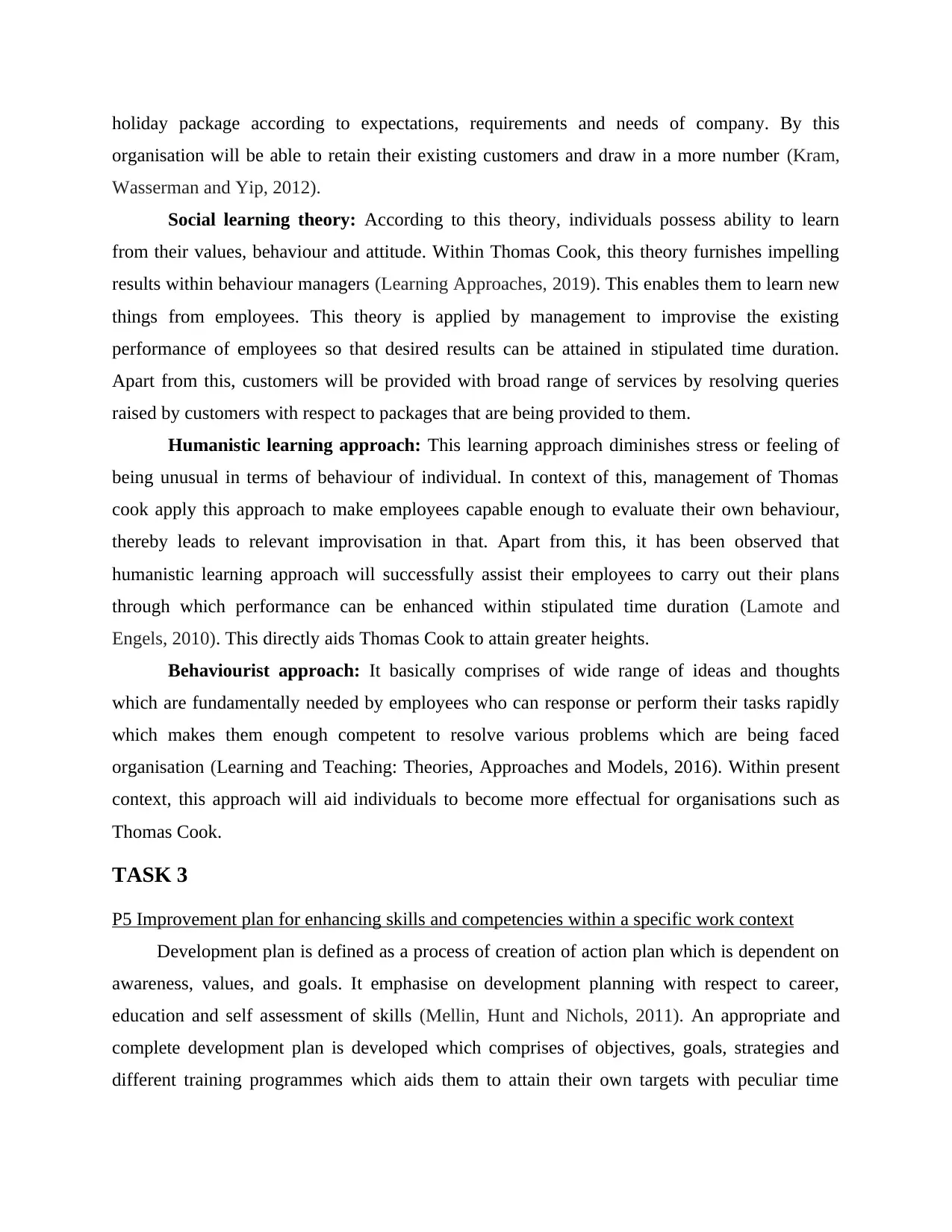
holiday package according to expectations, requirements and needs of company. By this
organisation will be able to retain their existing customers and draw in a more number (Kram,
Wasserman and Yip, 2012).
Social learning theory: According to this theory, individuals possess ability to learn
from their values, behaviour and attitude. Within Thomas Cook, this theory furnishes impelling
results within behaviour managers (Learning Approaches, 2019). This enables them to learn new
things from employees. This theory is applied by management to improvise the existing
performance of employees so that desired results can be attained in stipulated time duration.
Apart from this, customers will be provided with broad range of services by resolving queries
raised by customers with respect to packages that are being provided to them.
Humanistic learning approach: This learning approach diminishes stress or feeling of
being unusual in terms of behaviour of individual. In context of this, management of Thomas
cook apply this approach to make employees capable enough to evaluate their own behaviour,
thereby leads to relevant improvisation in that. Apart from this, it has been observed that
humanistic learning approach will successfully assist their employees to carry out their plans
through which performance can be enhanced within stipulated time duration (Lamote and
Engels, 2010). This directly aids Thomas Cook to attain greater heights.
Behaviourist approach: It basically comprises of wide range of ideas and thoughts
which are fundamentally needed by employees who can response or perform their tasks rapidly
which makes them enough competent to resolve various problems which are being faced
organisation (Learning and Teaching: Theories, Approaches and Models, 2016). Within present
context, this approach will aid individuals to become more effectual for organisations such as
Thomas Cook.
TASK 3
P5 Improvement plan for enhancing skills and competencies within a specific work context
Development plan is defined as a process of creation of action plan which is dependent on
awareness, values, and goals. It emphasise on development planning with respect to career,
education and self assessment of skills (Mellin, Hunt and Nichols, 2011). An appropriate and
complete development plan is developed which comprises of objectives, goals, strategies and
different training programmes which aids them to attain their own targets with peculiar time
organisation will be able to retain their existing customers and draw in a more number (Kram,
Wasserman and Yip, 2012).
Social learning theory: According to this theory, individuals possess ability to learn
from their values, behaviour and attitude. Within Thomas Cook, this theory furnishes impelling
results within behaviour managers (Learning Approaches, 2019). This enables them to learn new
things from employees. This theory is applied by management to improvise the existing
performance of employees so that desired results can be attained in stipulated time duration.
Apart from this, customers will be provided with broad range of services by resolving queries
raised by customers with respect to packages that are being provided to them.
Humanistic learning approach: This learning approach diminishes stress or feeling of
being unusual in terms of behaviour of individual. In context of this, management of Thomas
cook apply this approach to make employees capable enough to evaluate their own behaviour,
thereby leads to relevant improvisation in that. Apart from this, it has been observed that
humanistic learning approach will successfully assist their employees to carry out their plans
through which performance can be enhanced within stipulated time duration (Lamote and
Engels, 2010). This directly aids Thomas Cook to attain greater heights.
Behaviourist approach: It basically comprises of wide range of ideas and thoughts
which are fundamentally needed by employees who can response or perform their tasks rapidly
which makes them enough competent to resolve various problems which are being faced
organisation (Learning and Teaching: Theories, Approaches and Models, 2016). Within present
context, this approach will aid individuals to become more effectual for organisations such as
Thomas Cook.
TASK 3
P5 Improvement plan for enhancing skills and competencies within a specific work context
Development plan is defined as a process of creation of action plan which is dependent on
awareness, values, and goals. It emphasise on development planning with respect to career,
education and self assessment of skills (Mellin, Hunt and Nichols, 2011). An appropriate and
complete development plan is developed which comprises of objectives, goals, strategies and
different training programmes which aids them to attain their own targets with peculiar time
Paraphrase This Document
Need a fresh take? Get an instant paraphrase of this document with our AI Paraphraser
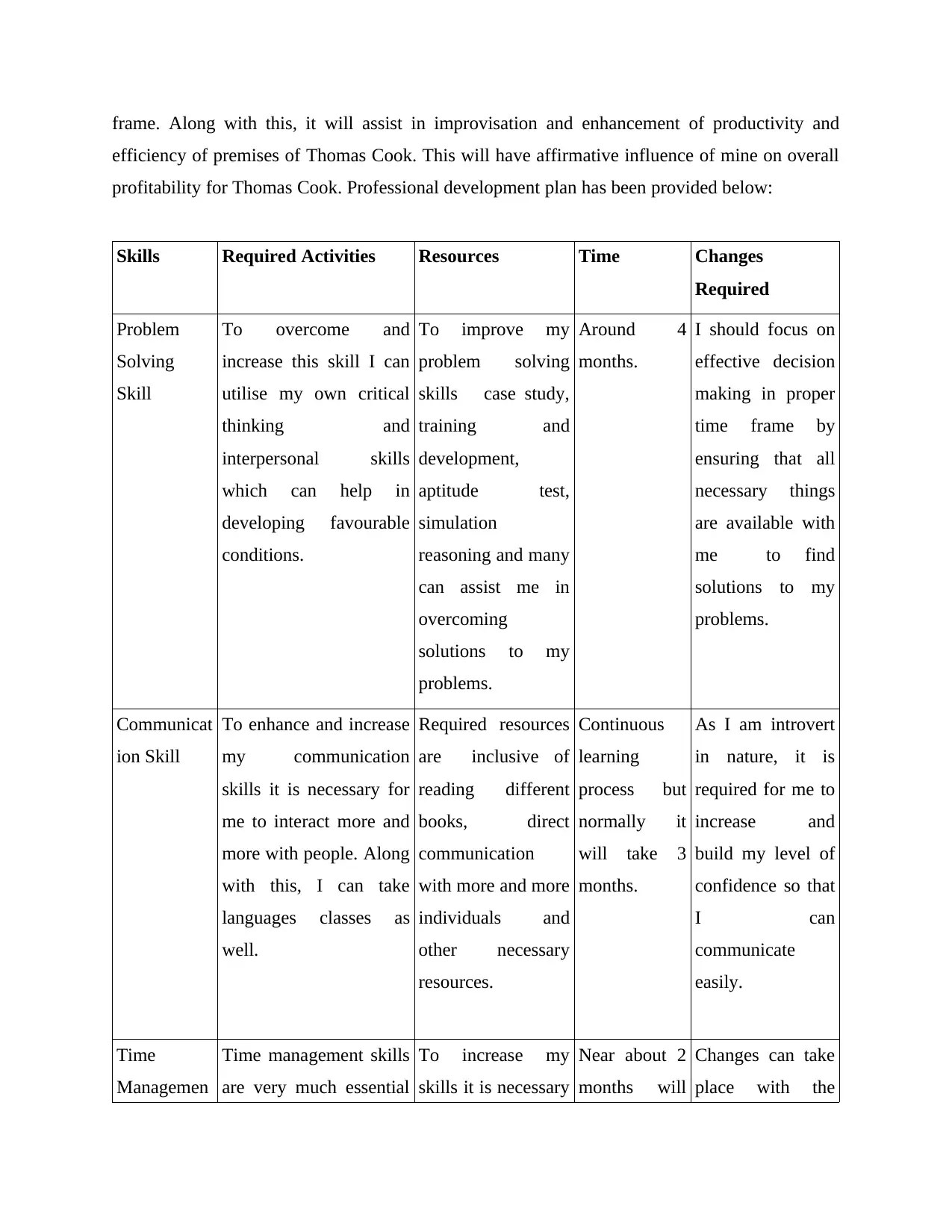
frame. Along with this, it will assist in improvisation and enhancement of productivity and
efficiency of premises of Thomas Cook. This will have affirmative influence of mine on overall
profitability for Thomas Cook. Professional development plan has been provided below:
Skills Required Activities Resources Time Changes
Required
Problem
Solving
Skill
To overcome and
increase this skill I can
utilise my own critical
thinking and
interpersonal skills
which can help in
developing favourable
conditions.
To improve my
problem solving
skills case study,
training and
development,
aptitude test,
simulation
reasoning and many
can assist me in
overcoming
solutions to my
problems.
Around 4
months.
I should focus on
effective decision
making in proper
time frame by
ensuring that all
necessary things
are available with
me to find
solutions to my
problems.
Communicat
ion Skill
To enhance and increase
my communication
skills it is necessary for
me to interact more and
more with people. Along
with this, I can take
languages classes as
well.
Required resources
are inclusive of
reading different
books, direct
communication
with more and more
individuals and
other necessary
resources.
Continuous
learning
process but
normally it
will take 3
months.
As I am introvert
in nature, it is
required for me to
increase and
build my level of
confidence so that
I can
communicate
easily.
Time
Managemen
Time management skills
are very much essential
To increase my
skills it is necessary
Near about 2
months will
Changes can take
place with the
efficiency of premises of Thomas Cook. This will have affirmative influence of mine on overall
profitability for Thomas Cook. Professional development plan has been provided below:
Skills Required Activities Resources Time Changes
Required
Problem
Solving
Skill
To overcome and
increase this skill I can
utilise my own critical
thinking and
interpersonal skills
which can help in
developing favourable
conditions.
To improve my
problem solving
skills case study,
training and
development,
aptitude test,
simulation
reasoning and many
can assist me in
overcoming
solutions to my
problems.
Around 4
months.
I should focus on
effective decision
making in proper
time frame by
ensuring that all
necessary things
are available with
me to find
solutions to my
problems.
Communicat
ion Skill
To enhance and increase
my communication
skills it is necessary for
me to interact more and
more with people. Along
with this, I can take
languages classes as
well.
Required resources
are inclusive of
reading different
books, direct
communication
with more and more
individuals and
other necessary
resources.
Continuous
learning
process but
normally it
will take 3
months.
As I am introvert
in nature, it is
required for me to
increase and
build my level of
confidence so that
I can
communicate
easily.
Time
Managemen
Time management skills
are very much essential
To increase my
skills it is necessary
Near about 2
months will
Changes can take
place with the
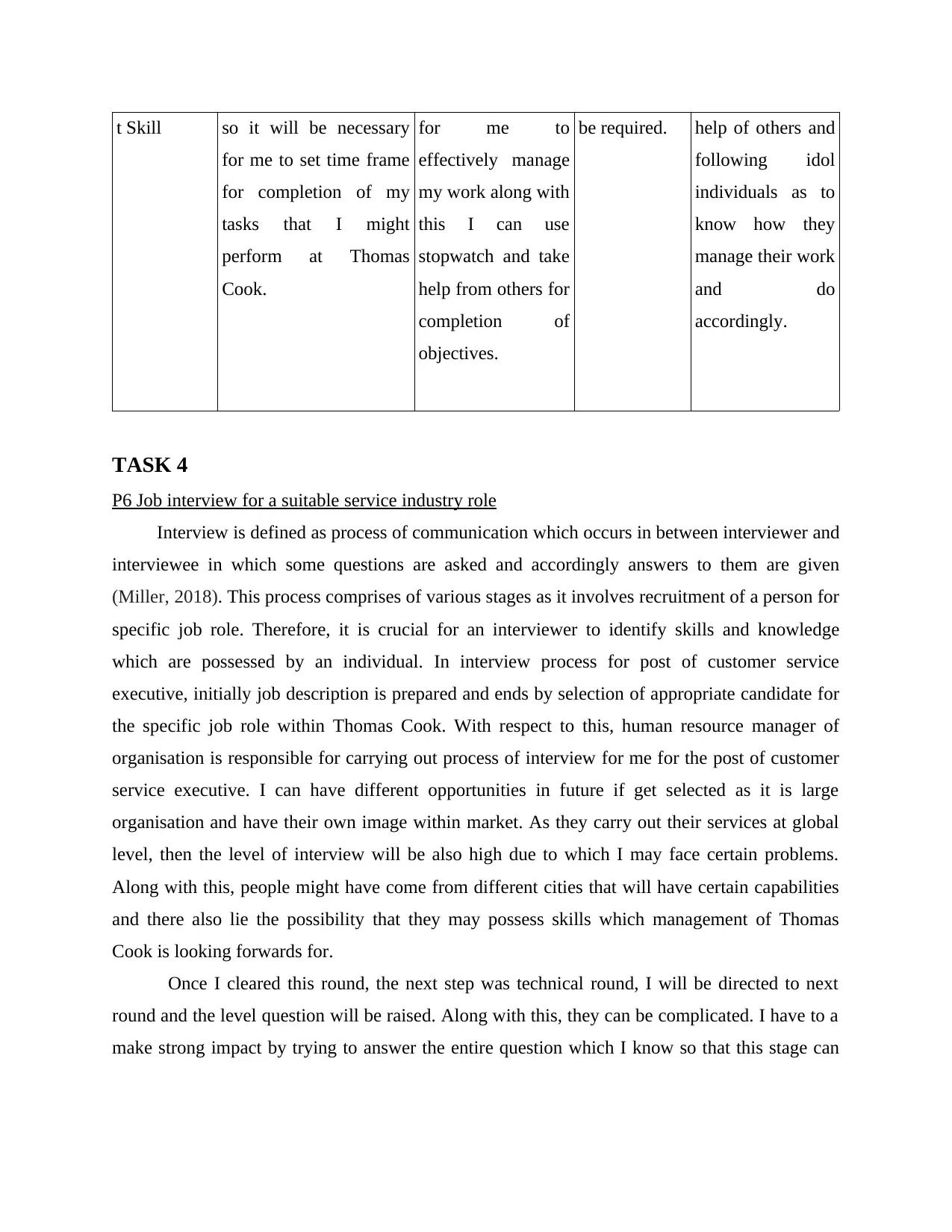
t Skill so it will be necessary
for me to set time frame
for completion of my
tasks that I might
perform at Thomas
Cook.
for me to
effectively manage
my work along with
this I can use
stopwatch and take
help from others for
completion of
objectives.
be required. help of others and
following idol
individuals as to
know how they
manage their work
and do
accordingly.
TASK 4
P6 Job interview for a suitable service industry role
Interview is defined as process of communication which occurs in between interviewer and
interviewee in which some questions are asked and accordingly answers to them are given
(Miller, 2018). This process comprises of various stages as it involves recruitment of a person for
specific job role. Therefore, it is crucial for an interviewer to identify skills and knowledge
which are possessed by an individual. In interview process for post of customer service
executive, initially job description is prepared and ends by selection of appropriate candidate for
the specific job role within Thomas Cook. With respect to this, human resource manager of
organisation is responsible for carrying out process of interview for me for the post of customer
service executive. I can have different opportunities in future if get selected as it is large
organisation and have their own image within market. As they carry out their services at global
level, then the level of interview will be also high due to which I may face certain problems.
Along with this, people might have come from different cities that will have certain capabilities
and there also lie the possibility that they may possess skills which management of Thomas
Cook is looking forwards for.
Once I cleared this round, the next step was technical round, I will be directed to next
round and the level question will be raised. Along with this, they can be complicated. I have to a
make strong impact by trying to answer the entire question which I know so that this stage can
for me to set time frame
for completion of my
tasks that I might
perform at Thomas
Cook.
for me to
effectively manage
my work along with
this I can use
stopwatch and take
help from others for
completion of
objectives.
be required. help of others and
following idol
individuals as to
know how they
manage their work
and do
accordingly.
TASK 4
P6 Job interview for a suitable service industry role
Interview is defined as process of communication which occurs in between interviewer and
interviewee in which some questions are asked and accordingly answers to them are given
(Miller, 2018). This process comprises of various stages as it involves recruitment of a person for
specific job role. Therefore, it is crucial for an interviewer to identify skills and knowledge
which are possessed by an individual. In interview process for post of customer service
executive, initially job description is prepared and ends by selection of appropriate candidate for
the specific job role within Thomas Cook. With respect to this, human resource manager of
organisation is responsible for carrying out process of interview for me for the post of customer
service executive. I can have different opportunities in future if get selected as it is large
organisation and have their own image within market. As they carry out their services at global
level, then the level of interview will be also high due to which I may face certain problems.
Along with this, people might have come from different cities that will have certain capabilities
and there also lie the possibility that they may possess skills which management of Thomas
Cook is looking forwards for.
Once I cleared this round, the next step was technical round, I will be directed to next
round and the level question will be raised. Along with this, they can be complicated. I have to a
make strong impact by trying to answer the entire question which I know so that this stage can
⊘ This is a preview!⊘
Do you want full access?
Subscribe today to unlock all pages.

Trusted by 1+ million students worldwide
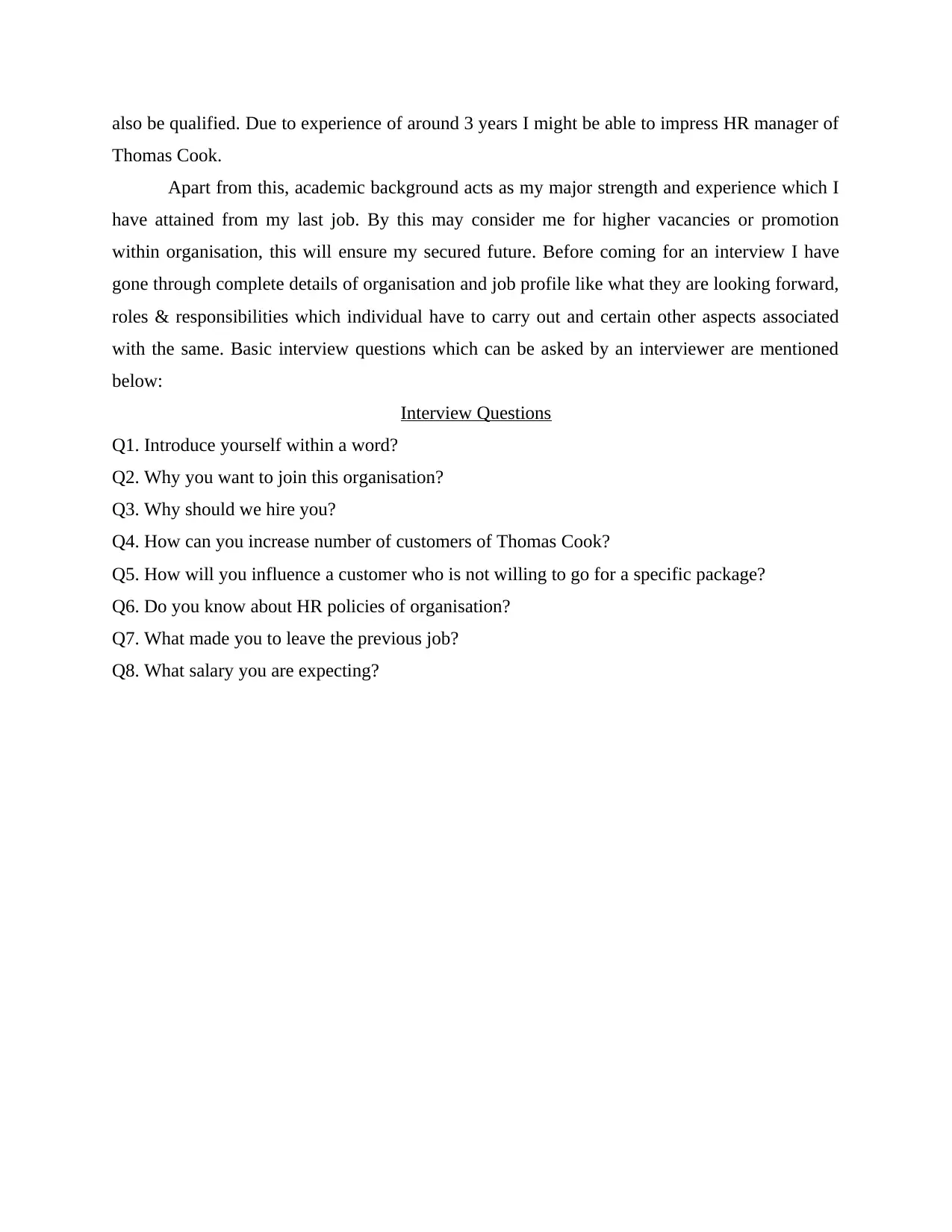
also be qualified. Due to experience of around 3 years I might be able to impress HR manager of
Thomas Cook.
Apart from this, academic background acts as my major strength and experience which I
have attained from my last job. By this may consider me for higher vacancies or promotion
within organisation, this will ensure my secured future. Before coming for an interview I have
gone through complete details of organisation and job profile like what they are looking forward,
roles & responsibilities which individual have to carry out and certain other aspects associated
with the same. Basic interview questions which can be asked by an interviewer are mentioned
below:
Interview Questions
Q1. Introduce yourself within a word?
Q2. Why you want to join this organisation?
Q3. Why should we hire you?
Q4. How can you increase number of customers of Thomas Cook?
Q5. How will you influence a customer who is not willing to go for a specific package?
Q6. Do you know about HR policies of organisation?
Q7. What made you to leave the previous job?
Q8. What salary you are expecting?
Thomas Cook.
Apart from this, academic background acts as my major strength and experience which I
have attained from my last job. By this may consider me for higher vacancies or promotion
within organisation, this will ensure my secured future. Before coming for an interview I have
gone through complete details of organisation and job profile like what they are looking forward,
roles & responsibilities which individual have to carry out and certain other aspects associated
with the same. Basic interview questions which can be asked by an interviewer are mentioned
below:
Interview Questions
Q1. Introduce yourself within a word?
Q2. Why you want to join this organisation?
Q3. Why should we hire you?
Q4. How can you increase number of customers of Thomas Cook?
Q5. How will you influence a customer who is not willing to go for a specific package?
Q6. Do you know about HR policies of organisation?
Q7. What made you to leave the previous job?
Q8. What salary you are expecting?
Paraphrase This Document
Need a fresh take? Get an instant paraphrase of this document with our AI Paraphraser
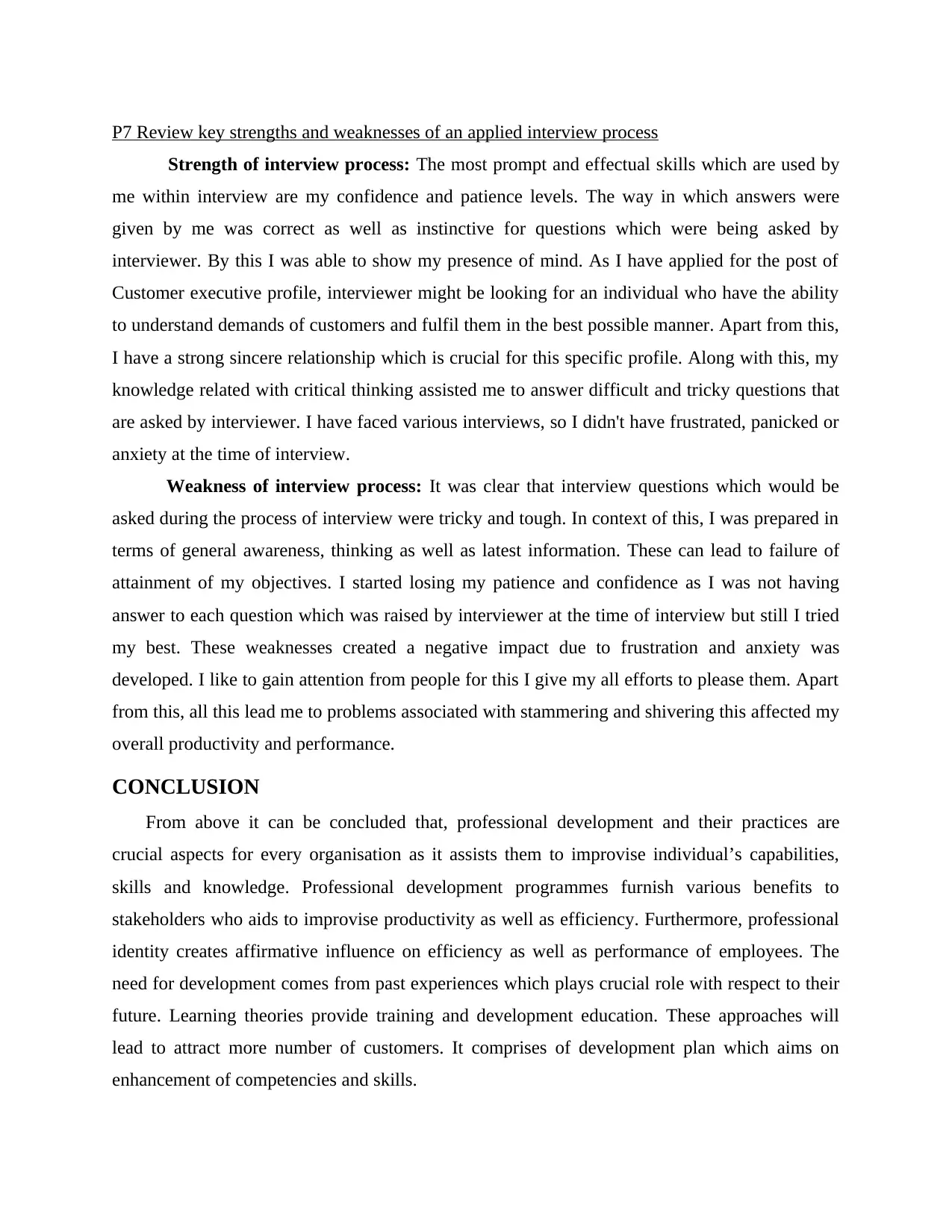
P7 Review key strengths and weaknesses of an applied interview process
Strength of interview process: The most prompt and effectual skills which are used by
me within interview are my confidence and patience levels. The way in which answers were
given by me was correct as well as instinctive for questions which were being asked by
interviewer. By this I was able to show my presence of mind. As I have applied for the post of
Customer executive profile, interviewer might be looking for an individual who have the ability
to understand demands of customers and fulfil them in the best possible manner. Apart from this,
I have a strong sincere relationship which is crucial for this specific profile. Along with this, my
knowledge related with critical thinking assisted me to answer difficult and tricky questions that
are asked by interviewer. I have faced various interviews, so I didn't have frustrated, panicked or
anxiety at the time of interview.
Weakness of interview process: It was clear that interview questions which would be
asked during the process of interview were tricky and tough. In context of this, I was prepared in
terms of general awareness, thinking as well as latest information. These can lead to failure of
attainment of my objectives. I started losing my patience and confidence as I was not having
answer to each question which was raised by interviewer at the time of interview but still I tried
my best. These weaknesses created a negative impact due to frustration and anxiety was
developed. I like to gain attention from people for this I give my all efforts to please them. Apart
from this, all this lead me to problems associated with stammering and shivering this affected my
overall productivity and performance.
CONCLUSION
From above it can be concluded that, professional development and their practices are
crucial aspects for every organisation as it assists them to improvise individual’s capabilities,
skills and knowledge. Professional development programmes furnish various benefits to
stakeholders who aids to improvise productivity as well as efficiency. Furthermore, professional
identity creates affirmative influence on efficiency as well as performance of employees. The
need for development comes from past experiences which plays crucial role with respect to their
future. Learning theories provide training and development education. These approaches will
lead to attract more number of customers. It comprises of development plan which aims on
enhancement of competencies and skills.
Strength of interview process: The most prompt and effectual skills which are used by
me within interview are my confidence and patience levels. The way in which answers were
given by me was correct as well as instinctive for questions which were being asked by
interviewer. By this I was able to show my presence of mind. As I have applied for the post of
Customer executive profile, interviewer might be looking for an individual who have the ability
to understand demands of customers and fulfil them in the best possible manner. Apart from this,
I have a strong sincere relationship which is crucial for this specific profile. Along with this, my
knowledge related with critical thinking assisted me to answer difficult and tricky questions that
are asked by interviewer. I have faced various interviews, so I didn't have frustrated, panicked or
anxiety at the time of interview.
Weakness of interview process: It was clear that interview questions which would be
asked during the process of interview were tricky and tough. In context of this, I was prepared in
terms of general awareness, thinking as well as latest information. These can lead to failure of
attainment of my objectives. I started losing my patience and confidence as I was not having
answer to each question which was raised by interviewer at the time of interview but still I tried
my best. These weaknesses created a negative impact due to frustration and anxiety was
developed. I like to gain attention from people for this I give my all efforts to please them. Apart
from this, all this lead me to problems associated with stammering and shivering this affected my
overall productivity and performance.
CONCLUSION
From above it can be concluded that, professional development and their practices are
crucial aspects for every organisation as it assists them to improvise individual’s capabilities,
skills and knowledge. Professional development programmes furnish various benefits to
stakeholders who aids to improvise productivity as well as efficiency. Furthermore, professional
identity creates affirmative influence on efficiency as well as performance of employees. The
need for development comes from past experiences which plays crucial role with respect to their
future. Learning theories provide training and development education. These approaches will
lead to attract more number of customers. It comprises of development plan which aims on
enhancement of competencies and skills.
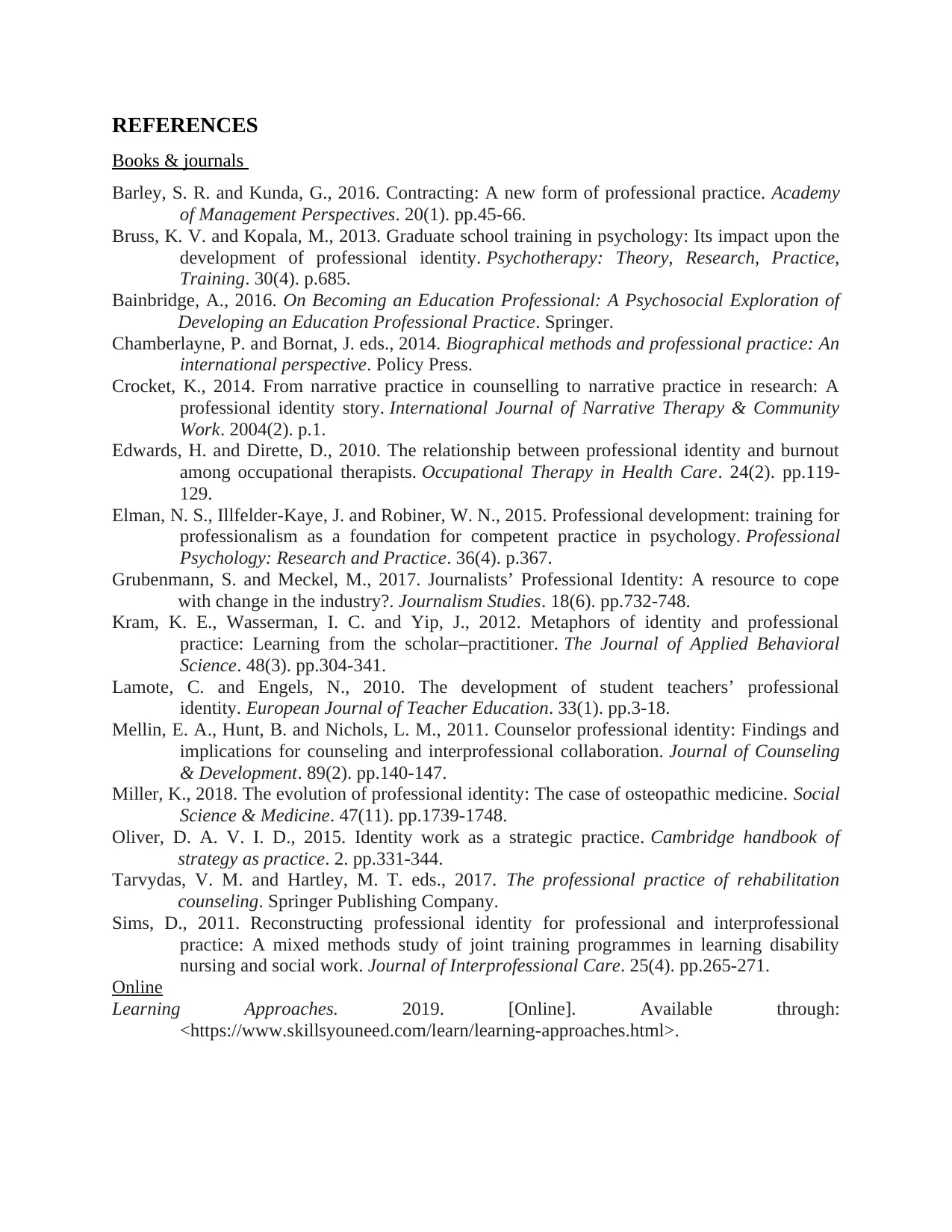
REFERENCES
Books & journals
Barley, S. R. and Kunda, G., 2016. Contracting: A new form of professional practice. Academy
of Management Perspectives. 20(1). pp.45-66.
Bruss, K. V. and Kopala, M., 2013. Graduate school training in psychology: Its impact upon the
development of professional identity. Psychotherapy: Theory, Research, Practice,
Training. 30(4). p.685.
Bainbridge, A., 2016. On Becoming an Education Professional: A Psychosocial Exploration of
Developing an Education Professional Practice. Springer.
Chamberlayne, P. and Bornat, J. eds., 2014. Biographical methods and professional practice: An
international perspective. Policy Press.
Crocket, K., 2014. From narrative practice in counselling to narrative practice in research: A
professional identity story. International Journal of Narrative Therapy & Community
Work. 2004(2). p.1.
Edwards, H. and Dirette, D., 2010. The relationship between professional identity and burnout
among occupational therapists. Occupational Therapy in Health Care. 24(2). pp.119-
129.
Elman, N. S., Illfelder-Kaye, J. and Robiner, W. N., 2015. Professional development: training for
professionalism as a foundation for competent practice in psychology. Professional
Psychology: Research and Practice. 36(4). p.367.
Grubenmann, S. and Meckel, M., 2017. Journalists’ Professional Identity: A resource to cope
with change in the industry?. Journalism Studies. 18(6). pp.732-748.
Kram, K. E., Wasserman, I. C. and Yip, J., 2012. Metaphors of identity and professional
practice: Learning from the scholar–practitioner. The Journal of Applied Behavioral
Science. 48(3). pp.304-341.
Lamote, C. and Engels, N., 2010. The development of student teachers’ professional
identity. European Journal of Teacher Education. 33(1). pp.3-18.
Mellin, E. A., Hunt, B. and Nichols, L. M., 2011. Counselor professional identity: Findings and
implications for counseling and interprofessional collaboration. Journal of Counseling
& Development. 89(2). pp.140-147.
Miller, K., 2018. The evolution of professional identity: The case of osteopathic medicine. Social
Science & Medicine. 47(11). pp.1739-1748.
Oliver, D. A. V. I. D., 2015. Identity work as a strategic practice. Cambridge handbook of
strategy as practice. 2. pp.331-344.
Tarvydas, V. M. and Hartley, M. T. eds., 2017. The professional practice of rehabilitation
counseling. Springer Publishing Company.
Sims, D., 2011. Reconstructing professional identity for professional and interprofessional
practice: A mixed methods study of joint training programmes in learning disability
nursing and social work. Journal of Interprofessional Care. 25(4). pp.265-271.
Online
Learning Approaches. 2019. [Online]. Available through:
<https://www.skillsyouneed.com/learn/learning-approaches.html>.
Books & journals
Barley, S. R. and Kunda, G., 2016. Contracting: A new form of professional practice. Academy
of Management Perspectives. 20(1). pp.45-66.
Bruss, K. V. and Kopala, M., 2013. Graduate school training in psychology: Its impact upon the
development of professional identity. Psychotherapy: Theory, Research, Practice,
Training. 30(4). p.685.
Bainbridge, A., 2016. On Becoming an Education Professional: A Psychosocial Exploration of
Developing an Education Professional Practice. Springer.
Chamberlayne, P. and Bornat, J. eds., 2014. Biographical methods and professional practice: An
international perspective. Policy Press.
Crocket, K., 2014. From narrative practice in counselling to narrative practice in research: A
professional identity story. International Journal of Narrative Therapy & Community
Work. 2004(2). p.1.
Edwards, H. and Dirette, D., 2010. The relationship between professional identity and burnout
among occupational therapists. Occupational Therapy in Health Care. 24(2). pp.119-
129.
Elman, N. S., Illfelder-Kaye, J. and Robiner, W. N., 2015. Professional development: training for
professionalism as a foundation for competent practice in psychology. Professional
Psychology: Research and Practice. 36(4). p.367.
Grubenmann, S. and Meckel, M., 2017. Journalists’ Professional Identity: A resource to cope
with change in the industry?. Journalism Studies. 18(6). pp.732-748.
Kram, K. E., Wasserman, I. C. and Yip, J., 2012. Metaphors of identity and professional
practice: Learning from the scholar–practitioner. The Journal of Applied Behavioral
Science. 48(3). pp.304-341.
Lamote, C. and Engels, N., 2010. The development of student teachers’ professional
identity. European Journal of Teacher Education. 33(1). pp.3-18.
Mellin, E. A., Hunt, B. and Nichols, L. M., 2011. Counselor professional identity: Findings and
implications for counseling and interprofessional collaboration. Journal of Counseling
& Development. 89(2). pp.140-147.
Miller, K., 2018. The evolution of professional identity: The case of osteopathic medicine. Social
Science & Medicine. 47(11). pp.1739-1748.
Oliver, D. A. V. I. D., 2015. Identity work as a strategic practice. Cambridge handbook of
strategy as practice. 2. pp.331-344.
Tarvydas, V. M. and Hartley, M. T. eds., 2017. The professional practice of rehabilitation
counseling. Springer Publishing Company.
Sims, D., 2011. Reconstructing professional identity for professional and interprofessional
practice: A mixed methods study of joint training programmes in learning disability
nursing and social work. Journal of Interprofessional Care. 25(4). pp.265-271.
Online
Learning Approaches. 2019. [Online]. Available through:
<https://www.skillsyouneed.com/learn/learning-approaches.html>.
⊘ This is a preview!⊘
Do you want full access?
Subscribe today to unlock all pages.

Trusted by 1+ million students worldwide
1 out of 13
Related Documents
Your All-in-One AI-Powered Toolkit for Academic Success.
+13062052269
info@desklib.com
Available 24*7 on WhatsApp / Email
![[object Object]](/_next/static/media/star-bottom.7253800d.svg)
Unlock your academic potential
Copyright © 2020–2026 A2Z Services. All Rights Reserved. Developed and managed by ZUCOL.





